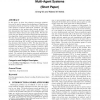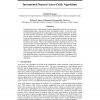34 search results - page 3 / 7 » Using Temporal Neighborhoods to Adapt Function Approximators... |
AAAI
2008
13 years 7 months ago
2008
Off-policy reinforcement learning is aimed at efficiently reusing data samples gathered in the past, which is an essential problem for physically grounded AI as experiments are us...
ATAL
2008
Springer
13 years 6 months ago
2008
Springer
In this paper, we show how adaptive prototype optimization can be used to improve the performance of function approximation based on Kanerva Coding when solving largescale instanc...
NIPS
2007
13 years 6 months ago
2007
We present four new reinforcement learning algorithms based on actor-critic and natural-gradient ideas, and provide their convergence proofs. Actor-critic reinforcement learning m...
CORR
2010
Springer
13 years 3 months ago
2010
Springer
We propose a new approach to value function approximation which combines linear temporal difference reinforcement learning with subspace identification. In practical applications...
GECCO
2009
Springer
13 years 9 months ago
2009
Springer
We apply CMA-ES, an evolution strategy with covariance matrix adaptation, and TDL (Temporal Difference Learning) to reinforcement learning tasks. In both cases these algorithms se...


